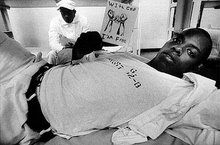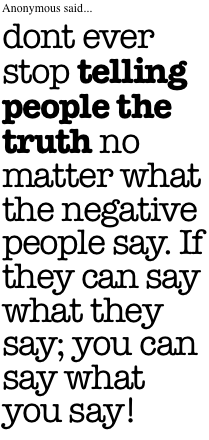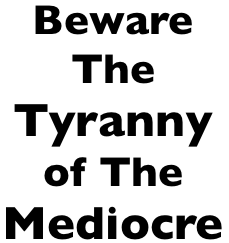Pfizer, the world’s largest drug maker, said Wednesday that it paid about $20 million to 4,500 doctors and other medical professionals for consulting and speaking on its behalf in the last six months of 2009, its first public accounting of payments to the people who decide which drugs to recommend. Pfizer also paid $15.3 million to 250 academic medical centers and other research groups for clinical trials in the same period.
Wednesday, October 06, 2010
If You Still Think Modern Medicine Has Anything To Do With "Science" ... You Might Be A Plantation Negro
Pfizer, the world’s largest drug maker, said Wednesday that it paid about $20 million to 4,500 doctors and other medical professionals for consulting and speaking on its behalf in the last six months of 2009, its first public accounting of payments to the people who decide which drugs to recommend. Pfizer also paid $15.3 million to 250 academic medical centers and other research groups for clinical trials in the same period.
Subscribe to:
Post Comments (Atom)















































































































6 comments:
$4000 each? Negro please. For alot of doctors that amounts to two 12 hours shifts...so, my answer is:
And?? Is that your "damning" evidence?
DMG you don't find the fact that thousands of doctors are on the payrolls of big pharmaceutical corporations a conflict of interest? We know you are obsessed with dv but you really need to give it a break. That shyt is foul!
Well Anonymous (do get a name...), there's a problem with your logic. $4,000 isn't exactly "on the payroll".
There are approximately 17,800 new doctors every year and 788,000 active physicians in the United States.
You've made the leap in logic from reading a clip of a news story about 4,500 doctors AND other medical professionals (which could be anything from a nursing assistant to a Public Health clerk) receiving compensation for consulting and speaking for a drug company to to assuming there is collusion.
So how many doctors are among the 4,500?
You don't know.
So how many doctors received money?
You don't know.
How many who received money are actively engaging in patient care?
You don't know.
How many doctors who are actively engaging in patient care who received money from this drug company prescribed a drug based on payment received rather than medical need?
You don't know if they've ever done so.
There could be 1 or 4,500?
You see my point? People make leaps in logic assuming guilt.
Part II,
The problem is how this discussion is being framed on this blog, and other places of public opinion without understanding details.
Let me ask you some questions.
Do you think doctors get rich by prescribing medications?
If so, then how?
While you are at it, do you know how doctors get paid? Who pays the overhead? How much malpractice insurance premiums cost? I'm curious about the level of knowledge the general public has about this topic.
Quacks!
How Scientific Is Modern Medicine Really?
Doctors today commonly assert that they practice "scientific medicine," and patients think that the medical treatments they receive are "scientifically proven." However, this ideal is a dream, not reality, and a clever and profitable marketing ruse, not fact.
The British Medical Journal's "Clinical Evidence" analyzed common medical treatments to evaluate which are supported by sufficient reliable evidence (BMJ, 2007). They reviewed approximately 2,500 treatments and found:
• 13 percent were found to be beneficial
• 23 percent were likely to be beneficial
• Eight percent were as likely to be harmful as beneficial
• Six percent were unlikely to be beneficial
• Four percent were likely to be harmful or ineffective.
• 46 percent were unknown whether they were efficacious or harmful
In the late 1970s, the US government conducted a similar evaluation and found a strikingly similar result. They found that only 10 percent to 20 percent of medical treatment had evidence of efficacy (Office of Technology Assessment, 1978).
Doctors like to point to the "impressive" efficacy of their treatments in real serious diseases, like cancer, and doctors (and drug companies) are emphatic about asserting that anyone or any company that says (or even suggests) that they have a treatment that might help people with cancer are "quacks." However, do they maintain this same standard when evaluating their own treatments? Even a recent issue of Newsweek highlighted the fact that "We Fought Cancer, and Cancer Won" (Begley, 2010). Despite the truly massive amounts of money that doctors, hospitals and drug companies are effectively extracting from patients, employers, insurance companies and governments, we are certainly not getting our money's worth.
Even when there is "proven efficacy of treatment" in studies, the bigger question is how common is this proven efficacy utilized in medical care today? Be prepared to be shocked.
http://www.huffingtonpost.com/dana-ullman/how-scientific-is-modern_b_543158.html
A major reason why health care is in such a shambles is that the medical establishment has allowed itself to be bought off by the pharmaceutical industry, whose prime motive is profit.
"Pharmaceutical companies have curried the favor of practicing physicians for many years... As the cost of development and marketing of pharmaceuticals increased [during the 1960's], the drug companies efforts to attract the allegiance of practicing physicians intensified.
"Not only did drug company operation costs increase markedly, but the rewards of the marketplace rose tremendously.... The increase in revenues brought competition which led to a nationwide increase in drug advertising. Advertisements in medical journals and public magazines were popularized by carefully controlled news releases associated with 'medical breakthroughs.'
"These advertising efforts, which began with gifts to practicing doctors and medical students, have become a massive campaign to mold the attitudes, thoughts, and policies of practicing physicians. Drug companies hire detail men to visit physicians' offices and to distribute drug samples. They describe the indications for these drugs and attempt to persuade physicians to use their products. Like any other salesman, they denigrate the products of their competitors while glossing over the shortcomings of their own. Detail men have no formal medical or pharmacological training and are not regulated by any state or federal agencies. Despite their lack of training, these salesmen have been very effective. Their sales campaigns have been so successful within the United States that the average physician today has virtually been trained by the drug detail man. This practice has led to widespread overuse of drugs by both physicians in their everyday practice and the lay public.... With the exception of heroin and cocaine, 85 percent of all drugs currently abused in the streets are manufactured by 'ethical' drug companies.... Gross sales forecasts from these 'ethical' drug companies deliberately include profits made from illicit sales to drug peddlers.
"The drug industry woos young medical students by offering them gifts, free trips to 'conferences', and free 'educational material.'Yeah boy!
A double page article titled "$200m 'bribe' to lure our doctors", appearing in the Sun Herald (August 18, 1992), reported that:
" Drug companies spend a massive $200 million every year in Australia on marketing their products... That represents almost $10,000 a year spent attempting to woo EACH of Australia's 21,000 'actively prescribing' GPs, according to Dr Ken Harvey from La Trobe University."
The article cited Theo van Lieshout, secretary of the NSW Doctors' Reform Society as saying that 50 per cent of drugs on the market did not exist 10 years ago - and doctors had not learned about them in medical school. Busy physicians therefore rely mainly on drug company sales staff to tell them about new medications.
"The students concede concern. The problem is, after five years out in practice, with six drug reps a week coming in, they have gone away from prescribing sensibly and by scientific name to prescribing the brand promoted by the last rep who walked in."
Post a Comment